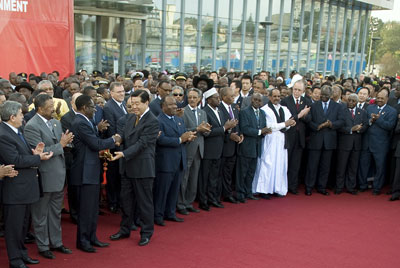China didn’t make the cut for our 10 most censored countries. While the Chinese Communist Party’s censorship apparatus is notorious, journalists and Internet users work hard to overcome the restrictions. Nations like Eritrea and North Korea lack that dynamism.
But China is not off the hook. In fact, CPJ’s report reads like a list of China’s favorite allies. China loves these nations, judging by its state media reports on Eritrea, Equatorial Guinea, Burma, Belarus and more. And they love China back: Iranian Deputy Minister for Economic Affairs Ali Agha Mohammadi, announcing plans for Internet censorship in 2011, openly cited China’s information controls as a model, according to Fast Company magazine.
• 10 Most Censored
• Video Report:
Top 10 Countdown
• 中文 (pdf)
What’s more, international news reports indicate that China is nurturing these regimes with technological and economic support, although the extent of its involvement is difficult to track. China, while not the world’s most censored, may be on the way to becoming the world’s censor.
Two Chinese telecom giants have been accused of facilitating censorship in Iran, the fourth most-censored nation on CPJ’s list. Huawei sold equipment allowing Iranian police to track cellphone users in 2009 during a crackdown on anti-government demonstrators, according to The Wall Street Journal. “Huawei representatives emphasized that, being from China, they had expertise censoring the news,” the Journal reported. Huawei denied wrongdoing and said it would limit operations in Iran. Reuters revealed a 2010 deal between Iran and China-based ZTE for surveillance apparatus, though ZTE said the equipment it provided was “standard.” ZTE also declined to comment on a 2011 Journal article saying it, along with some Western companies, provided technology for Muammar Qaddafi’s agents to spy on emails and chat messages.
These reports are the more concerning because the companies involved are huge global players. Both Huawei and ZTE are active in Africa. They have operated in Central Asia for more than a decade, according to the Open Society Institute’s New York-based EurasiaNet website. And Sri Lankan media expert Sanjana Hattotuwa, on his citizen journalism website Groundviews, notes that “major telecoms providers in Sri Lanka have multimillion dollar contracts with ZTE and Huawei,” citing local media reports and a WikiLeaks U.S. diplomatic cable from Colombo in 2009.
The U.S., the U.K., and Australia have all expressed concerns over the companies’ possible ties to the Chinese government, and the cyber-security implications of their global presence. A British security official told The Australian newspaper he had “no doubt” Huawei partnered with China’s espionage services. Yet “allegations against Huawei and ZTE are almost impossible to prove,” EurasiaNet said.
Here are some other examples of how China’s repressive attitude is creeping beyond its borders:
- Setting the regional information agenda. Police in Nepal arrested journalists and Tibetan activists and threatened to deport them to China in 2008, according to Human Rights Watch. A Chinese embassy official and local police ordered Bangladeshi photographer Shahidul Alam to close a gallery exhibit showing photographs of Tibet in 2009. Burmese authorities received computer training from China and Russia in 2008, according to CPJ research.
- Diplomatic influence. China is North Korea’s largest trade partner, undermining economic sanctions imposed by the U.N. and Western governments and helping to uphold one of the world’s worst censors (with occasional caveats). The military-backed government in Burma has enjoyed the same support. Reuters reported that ZTE’s trading in Iran also violated U.S. sanctions by acting as a third party to supply the nation with American software. At a 2011 London technology conference on cyber-security, China allied with Russia against the U.S. and U.K. to lobby for stronger Internet controls, according to Reuters.
- Cyberattacks. A number of hacking attacks directed at intellectual property of global companies and groups perceived as anti-China — including Tibetan human rights organizations and journalists — have been traced to computers in China, according to international news reports. The New York Times said there is no proof the campaigns are government sponsored, but traced some to Chinese Internet company employee Gu Kaiyuan.
- Obstructing cultural events. Liu Xiaobo, Liao Yiwu, Yu Jie, Ai Weiwei, and Tibetan blogger Woeser are among dozens of high-profile Chinese intellectuals banned from travelling to international events. Chinese government organizations can dictate who is invited to an event as a condition of their participation, according to the U.K. Guardian.
- Market share. Official figures put the number of Chinese Internet users at more than 500 million. Foreign technology companies comply with Beijing’s orders to filter content or get the boot, denying them a lucrative share of the market.
- Expanding media empire. State news agency Xinhua reported 23 bureaus in Africa in 2011. China Central Television says it broadcasts in 140 countries around the world. China Radio International operates out of Jerusalem, Sydney, London, Lagos, Harare, and Washington D.C. While some government-backed global media outlets, such as the BBC, stress editorial independence, propaganda officials encourage Chinese media overseas to remain loyal to the party’s agenda.
In China, this media push is known as “soft power.” While many media analysts believe editorial restrictions will prevent Chinese media from competing on a world stage, it already reaches a wide audience. Over 2.5 million copies of state newspaper China Daily’s China Watch advertising supplement have been distributed in The Washington Post, The New York Times, and the U.K. Daily Telegraph, according to the Guardian.
Why worry about something as low-impact as an advertising supplement? First, it’s packaged as news. Second, because the news outlets which carry it might compromise their standards. Earlier this year, the Post admitted in a correction that “the Chinese government modified, deleted, and added questions” to an interview it published with Vice President Xi Jinping.
Modifying, deleting, and adding? That’s exactly how propaganda officials manage news reports domestically. If Chinese leaders have their way, it’s what they will soon be doing all over the world.
